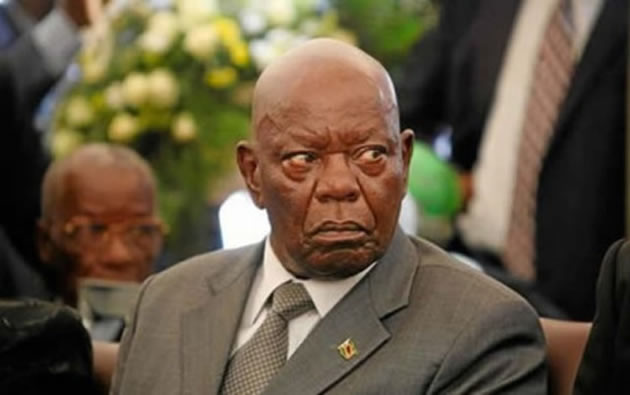Futility of eliminationism

Reason Wafawarova on Monday
Daniel Goldhagen coined the term eliminationism in his book “Hitler’s Willing Executioners.” He centred his argument on the political ideology rooted in eliminative materialism, and from his viewpoint, our ordinary, common sense understanding of the mind is deeply wrong.
Eliminationism in politics is common across the world, and essentially it is the belief that one’s political opponents are “a cancer on the body politic that must be excised — either by separation from the public at large, through censorship, or by outright extermination,” Phyllis Bernard (2009).
The horrendous elimination of the Gaddafi family and the Jamahiriya practitioners in Libya is a classic example of imperialist eliminationism. We also saw the arrogant bullish invasion of Iraq in 2003, with it the overthrow and murder of Saddam Hussein, and we have come to realise that the intended elimination of the Taliban in Afghanistan has failed, revealing the shortcomings of Western interventionism.
Donald Trump says US president Barack Obama founded ISIS, ostensibly to help eliminate the Assad regime in Syria.
Part of the dark history of this world includes the gruesome nato exploits in Yugoslavia, where Western consciences and interests caused a huge refugee crisis. The idea was to eliminate communism.
The 1994 Rwanda genocide is a chilling reminder of the danger that comes with intolerance and eliminationist politics. The genocide is an excruciating recollection on the collective conscience of the African people.
Equally indicting on our collective conscience are the chilling tragedies of war crimes committed in Darfur between 2003 and 2010.
Sad memories come with the Cambodian genocide between 1975 and 1979, just like with the carcinogenic Operation Condor in Latin America between 1973 and 1985, and the catastrophic atomic bombing of Hiroshima and Nagasaki in 1945. The Auschwitz concentration camp death marches of 1944 and 1945 also come to mind, as well as the barbarous British concentration camps for the Mau Mau freedom fighters in Kenya between 1952 and 1960.
Every August we celebrate our Heroes, lest we forget the genocidal Operation Dingo, better known as the Chimoio Massacre of November 23 to 25 1977 — a painful reminder of how 3 000 Zanla freedom fighters were killed by Ian Smith’s forces, leaving another 5 000 seriously injured, some of whom are still with us to this day.
We will never forget the ruthless Operation Eland, or the Nyadzonya Massacre, another of many of Ian Smith’s acts of war crimes, which claimed over 1 000 lives of Zanla trainee fighters in 1976.
Since September 11, 2001, the West has sensationalised the rhetoric on eliminationism, and so many countries have had to endure the excruciating pain of Western administered wars coming in the name of either democratisation or fighting the convenient scourge of terrorism.
It was imposed upon the world that America had every right to ravage the mountains and villages of Afghanistan in pursuit of deadly terrorists in 2001, and Tony Blair still believes that the decision to overthrow and murder Saddam Hussein must be hailed as a legendary heroic Western act of democratisation.
It really does not matter that there is very little of Iraq left after the Bush led ‘democratisation’ invasion, and that ISIS has escalated sectarianism to a full-fledged war. Blair thinks all this is a worthy price for the trophy of Saddam Hussein’s head.
Libya has virtually become a failed state run by numerous rival militia groups with a hapless government in Tripoli absolutely inert.
The Libyan crisis resulted in a huge refugee influx into Europe, and there is a replica development in Syria, where after the West created and funded ISIS, the influx of refugees into Europe has just become a nightmare.
Democracy in its Aristotelian sense is all about running matters of governance in a non-discriminations way, adopting a tolerant approach where competing political ideas are packaged and put to the vote in search of majority opinion. But the vote is not trusted even at the UN Security Council, where it can be vetoed to protect minority interests.
Let us look at Zimbabwe’s domestic politics across the divide. The opposition MDC is now called MDC-T after a series of splits mainly caused by the politics of eliminating opponents of the party leader. When people are disgruntled as was the case with the recent “unilateral” appointment of two extra vice presidents in the MDC-T, the tendency is to railroad the dissenters into line by threatening them with elimination.
There are some supporters of Zanu-PF who sincerely seem to believe that it is patriotic resolve to seek the elimination of certain opposition parties from the political scene. It cannot be admirable for Zanu-PF to seek to defeat the MDC or any other opposition party by employing the politics of elimination. That attitude is the root cause of intolerance and violence.
It is not a sign of patriotism for anyone in Zanu-PF to incite Zimbabweans into the politics of eliminationism where parties other than the ruling party are viewed as a threat to the national security of the country, or as a cancer that is fatally detrimental to the national good. Zanu-PF has neither monopoly nor exclusive custodianship to national security.
The issue of national security is a matter for our security sector, not a political preoccupation. General Chiwenga recently assured the nation that the Zimbabwe Defence Forces have what it takes to protect the national interest.
What politics can do in a democracy is expose the detrimental values of any political party that can be viewed as a national threat, and once that is done the party in question becomes unelectable. No one must be arrested at the behest of his or her political rivals.
Those in our politics who believe in the elimination of political opponents are not only undemocratic, but are also a huge risk to national stability.
We have unrepentant eliminationists within our political landscape across the divide. The current standoff between the ZNLWVA leadership and Zanu-PF leadership is a very sad indictment on our sense of political maturity as a nation.
Didymus Mutasa vowed to eliminate members of a faction he was opposed to within Zanu-PF in early 2014. He publicly ordered party youths loyal to his faction to eliminate members of this rival camp, “so that we remain with only one camp.” He urged party youths to eliminate “the weevils” like pests.
We know things did not turn exactly the way Mutasa had wanted, and that his idea of justice was ironically meted on himself and many others from his camp. The man still cannot stomach how he ended up the eliminated one.
It was quite disturbing to hear Mutasa, then a security guru in Government, publicly bragging that the party had eavesdropping capacities that could reveal offenders’ bedroom secrets at any time.
We are a democracy, not a monarchy. Even at their worst, ancient monarchies never sank to levels of such conscientious stupidity, where every dissenting voice has to be deemed an enemy.
We cannot be as simplistic as to simply dismiss characters like Mutasa without taking note of the culture of intolerance within our politics.
Purging of political opponents still continues unabated, justifiably so and arbitrarily as well; as also do the incessant rebellions, most of them by excitable fury-obsessed youths like Acie Lumumba, who is a very telling example of eloquent confusion.
We have seen discarded cadres from Zanu-PF in all manner of bitterness, and sometimes one is forced to doubt the wisdom behind this new culture of purging.
The question that needs a speedy answer is where this kind of politics is leading Zanu-PF and the nation. There are many better ways of rehabilitating wayward members of the party than expelling them, and surely there is no party that can ever grow stronger through purging its own members. Those who wish to create a majority party through purges must surely think twice.
One cannot imagine a stronger Zanu-PF without its vanguard war veteran element for example. Only unity can save Zanu-PF from demise.
Those among our political leaders who may happen to think that the youths are at their disposal for the exercise of politics of barbarism must have a rethink of the deadly impact of their primitiveness.
Our young politically aspiring people must be nurtured into tolerant democratic beings whose role in the politics of the country is to win the hearts of the majority, not to intimidate political enemies and to coerce the majority into miserable submission.
Politics is the game of ideas and numbers, not a cause for violence, injustice and elimination. It hurts to live under injustice, and a point is always reached when injustice has to give way to people power. Revolutions are never made; they just come.
We are after a country that stands against eliminationist and exterminationist politics, a country built on solid preventive measures against this necrosis.
Gone must be the day when our youths are viewed as tyrannical tools for undemocratic practices. Gone must be the day of the violent and intolerant politician, whose idea of victory is the elimination of political opponents.
We need democratic political institutions that are respected by all players in our political landscape, for only these can assure us as a nation that the incidence of eliminationist politics is radically minimised, or even eliminated.
Intolerance, from whomever it may come, cannot be justified in the name of nationalism or patriotism.
The braggarts that believe only them are the custodians of brilliant political ideas must not be allowed to infringe the national democratic process, and only constitutionalism can defend us from such bigots.
We hear some in Zanu-PF want to preserve the party by ensuring that there are no elements that will destroy the party from within. That fear is understandable,those destroying the party from within are simply overriding the democratic process, with impunity too.
In thinking about a preventive regime against eliminationist politics, we must take into perspective features about modernity itself and about the modern state.
We cannot run a modern state solely on values enshrined in the history of our liberation struggle, much as those values must continue to inspire our contemporary thought processes.
We must never lose sight of the structural relationships of our ethnic composition as a country. Understanding our diversity is the only way to understand our democratic culture.
The international context of our country must never be taken for granted. We are indeed a sovereign country, but sovereignty must not mislead us into some renegade status. We are part of the family of nations, and as such we must embrace the international arbiter of democratic values.
We must establish a truly democratic political culture that will enable us to deal with proximate factors producing the political opportunity and will to turn eliminationist desires into eliminationist onslaughts. When a political leader wants his political rivals purged, that leader must simply be frowned upon.
Mindsets cannot be changed through coercion. No idea can ever be forcibly thrust upon anyone.
Zimbabwe we are one and together we will overcome. It is homeland or death!
Reason Wafawarova is a political writer based in SYDNEY, Australia.









Comments